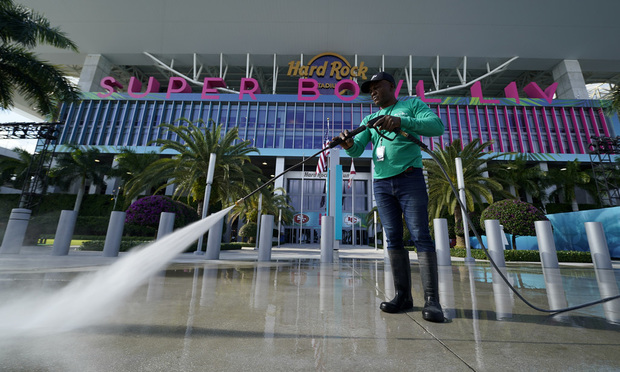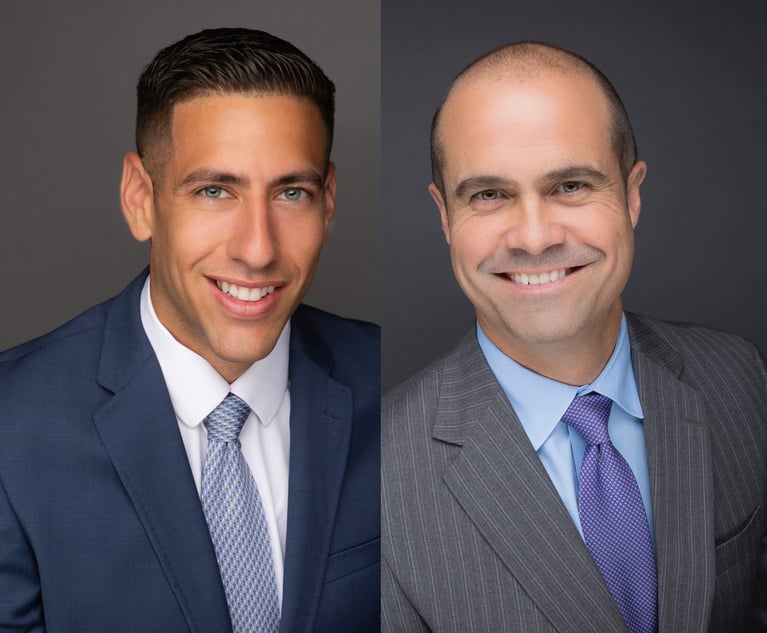How Bilzin Sumberg Helped End Miami's Decadelong Super Bowl Drought
Stonewalled by state and local governments, Miami Dolphins and Hard Rock Stadium ownership turned to Al Dotson and Bilzin Sumberg who helped secure public support for a new roof and other renovations at the stadium — a key factor in Miami landing the 2020 Super Bowl played between the Kansas City Chiefs and San Francisco 49ers.
January 31, 2020 at 05:00 AM
4 minute read
 Hard Rock Stadium in Miami Gardens, Florida, site of Super Bowl LIV between the San Francisco 49ers and the Kansas City Chiefs. (AP Photo/Chris Carlson)
Hard Rock Stadium in Miami Gardens, Florida, site of Super Bowl LIV between the San Francisco 49ers and the Kansas City Chiefs. (AP Photo/Chris Carlson)
Some may remember the soggy mess of Miami's 2010 Super Bowl: Heavy rains soaked fans packed into roofless Hard Rock Stadium and wreaked havoc on the carefully laid out logistical plans of the National Football League and the two competing teams, the New Orleans Saints and Indianapolis Colts.
What followed was a 10-year drought in Super Bowl hosting, tied for the longest span in Miami's history. The coveted region had already hosted nine of the blockbuster events (it also rained when Miami hosted the Super Bowl in 2007, where the late Prince sang Purple Rain during the halftime show.)
After the wet disaster of 2010, Miami Dolphins owner Stephen Ross and the stadium's ownership group began lobbying state and local governments almost immediately in an attempt to secure public financing for a roof. Ownership found themselves stonewalled at every turn as the specter of the Miami Marlins stadium, and the hundreds of millions of public funding secured to build it, overshadowed the effort.
Progress began in earnest only after the team ownership called Bilzin Sumberg managing partner Al Dotson, then the head of the firm's land use and government relations team, in 2011. Dotson immediately moved to classify the stadium as an "asset of regional import," which averted the need to secure state approval.
Dotson and the firm then pulled together lawyers from its corporate financing, real estate, land use, and tax group to create a unique financing system wherein the Dolphins and the stadium ownership would invest $500 million into a new roof and other improvements, and in return, Miami-Dade County would reward ownership with monetary rewards for bringing in big-name events like the Super Bowl.
"We had several meetings with Miami-Dade County leadership to work through an arrangement that we were quite frankly creating from whole cloth while recognizing the tax benefits that would come as a result of the Super Bowl and other events," said Dotson, who also serves on Miami's 2020 Super Bowl committee.
Bringing the Super Bowl to Miami triggers $4 million in incentive money from Miami-Dade, paid out of the county's hotel taxes. A World Cup Final or College Football Championship game would trigger a $3 million payout. A college football playoff game — such as the semi-final duel between Alabama and Oklahoma in December of 2018 — pays out $2 million.
Annual incentives are currently capped at $5.75 million, although that figure can be raised if approved by the county commission. So far, the Dolphins have requested just short of $6 million in payouts since the deal went into effect in 2016, and payments do not have to be doled out until 2024.
The deal also includes smaller tidbits, such as a clause that required the team ownership to employ a certain percentage of Miami Gardens and Miami-Dade small businesses for the renovation, a demand that ownership exceeded, according to Dotson.
For Dotson, the beauty of the deal is that it addresses the concerns of all stakeholders as a collaborative solution that incorporates the public, government and private ownership. He adds that the renovation was key to keeping the Miami Open in Miami in 2016, and the stadium will be a boon to the city's chances of landing a 2026 World Cup game, which is being hosted by the United States.
When asked if he's personally proud of the achievement, Dotson was characteristically demure:
"I'm proud that our community can benefit from this event and future marquee events," he said.
Read More:
Miami Judge Who Sanctioned Bilzin Sumberg is Removed From Case
This content has been archived. It is available through our partners, LexisNexis® and Bloomberg Law.
To view this content, please continue to their sites.
Not a Lexis Subscriber?
Subscribe Now
Not a Bloomberg Law Subscriber?
Subscribe Now
NOT FOR REPRINT
© 2025 ALM Global, LLC, All Rights Reserved. Request academic re-use from www.copyright.com. All other uses, submit a request to [email protected]. For more information visit Asset & Logo Licensing.
You Might Like
View All
Holland & Knight Hires Former Davis Wright Tremaine Managing Partner in Seattle
3 minute read


Local Boutique Expands Significantly, Hiring Litigator Who Won $63M Verdict Against City of Miami Commissioner
3 minute readLaw Firms Mentioned
Trending Stories
- 1New York-Based Skadden Team Joins White & Case Group in Mexico City for Citigroup Demerger
- 2No Two Wildfires Alike: Lawyers Take Different Legal Strategies in California
- 3Poop-Themed Dog Toy OK as Parody, but Still Tarnished Jack Daniel’s Brand, Court Says
- 4Meet the New President of NY's Association of Trial Court Jurists
- 5Lawyers' Phones Are Ringing: What Should Employers Do If ICE Raids Their Business?
Who Got The Work
J. Brugh Lower of Gibbons has entered an appearance for industrial equipment supplier Devco Corporation in a pending trademark infringement lawsuit. The suit, accusing the defendant of selling knock-off Graco products, was filed Dec. 18 in New Jersey District Court by Rivkin Radler on behalf of Graco Inc. and Graco Minnesota. The case, assigned to U.S. District Judge Zahid N. Quraishi, is 3:24-cv-11294, Graco Inc. et al v. Devco Corporation.
Who Got The Work
Rebecca Maller-Stein and Kent A. Yalowitz of Arnold & Porter Kaye Scholer have entered their appearances for Hanaco Venture Capital and its executives, Lior Prosor and David Frankel, in a pending securities lawsuit. The action, filed on Dec. 24 in New York Southern District Court by Zell, Aron & Co. on behalf of Goldeneye Advisors, accuses the defendants of negligently and fraudulently managing the plaintiff's $1 million investment. The case, assigned to U.S. District Judge Vernon S. Broderick, is 1:24-cv-09918, Goldeneye Advisors, LLC v. Hanaco Venture Capital, Ltd. et al.
Who Got The Work
Attorneys from A&O Shearman has stepped in as defense counsel for Toronto-Dominion Bank and other defendants in a pending securities class action. The suit, filed Dec. 11 in New York Southern District Court by Bleichmar Fonti & Auld, accuses the defendants of concealing the bank's 'pervasive' deficiencies in regards to its compliance with the Bank Secrecy Act and the quality of its anti-money laundering controls. The case, assigned to U.S. District Judge Arun Subramanian, is 1:24-cv-09445, Gonzalez v. The Toronto-Dominion Bank et al.
Who Got The Work
Crown Castle International, a Pennsylvania company providing shared communications infrastructure, has turned to Luke D. Wolf of Gordon Rees Scully Mansukhani to fend off a pending breach-of-contract lawsuit. The court action, filed Nov. 25 in Michigan Eastern District Court by Hooper Hathaway PC on behalf of The Town Residences LLC, accuses Crown Castle of failing to transfer approximately $30,000 in utility payments from T-Mobile in breach of a roof-top lease and assignment agreement. The case, assigned to U.S. District Judge Susan K. Declercq, is 2:24-cv-13131, The Town Residences LLC v. T-Mobile US, Inc. et al.
Who Got The Work
Wilfred P. Coronato and Daniel M. Schwartz of McCarter & English have stepped in as defense counsel to Electrolux Home Products Inc. in a pending product liability lawsuit. The court action, filed Nov. 26 in New York Eastern District Court by Poulos Lopiccolo PC and Nagel Rice LLP on behalf of David Stern, alleges that the defendant's refrigerators’ drawers and shelving repeatedly break and fall apart within months after purchase. The case, assigned to U.S. District Judge Joan M. Azrack, is 2:24-cv-08204, Stern v. Electrolux Home Products, Inc.
Featured Firms
Law Offices of Gary Martin Hays & Associates, P.C.
(470) 294-1674
Law Offices of Mark E. Salomone
(857) 444-6468
Smith & Hassler
(713) 739-1250






